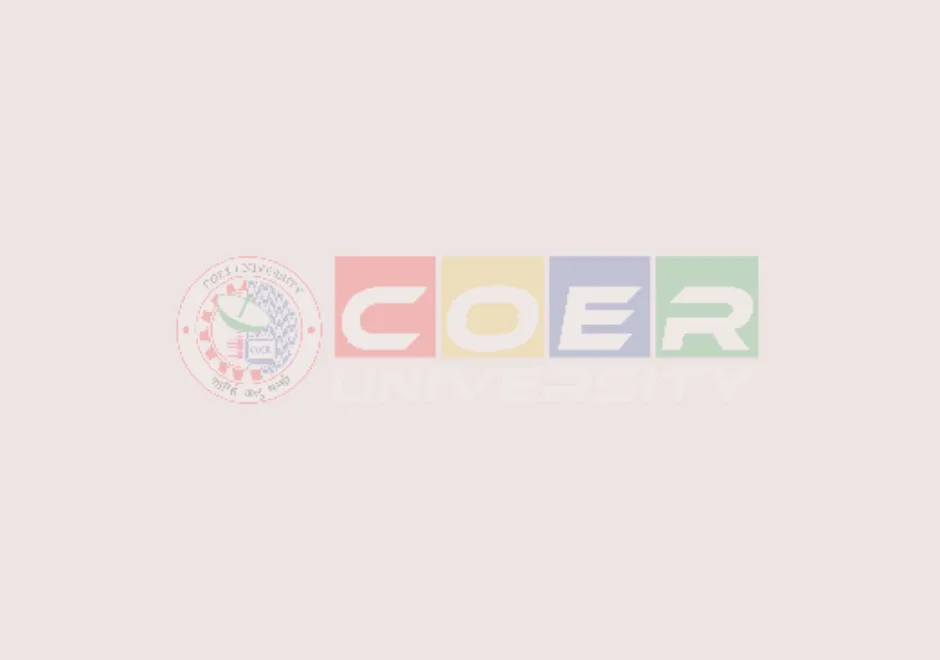
Master of Science (M.Sc.) in Computational Physics
Duration
2 Years
Eligibility Criteria
Bachelor's Degree in IT/ CS/ Mathematics/ PCM, BCA, B.Sc. Statistics/Data Science with a minimum of 55% marks

The M.Sc. in Computational Physics typically offers a curriculum designed to integrate theoretical physics principles with computational techniques and tools. Here are some areas listed that are commonly included in such a program: Computational Methods in Physics, Mathematical Methods for Physicists, Quantum Mechanics and Computational Quantum Physics, Statistical Mechanics and Molecular Dynamics, Computational Solid-State Physics, Computational Fluid Dynamics, High-Performance Computing and Parallel Programming, Research Projects in Computational Physics
Apply NowCurriculum
-
Mathematics for Computational Sciences
-
Quantum Physics
-
Statistical Physics
-
Scientific Programming
-
Fundamental of MS office
-
Scientific Programming lab
-
Foundation of Professional Development
-
(IPR)MOOC
-
Electromagnetic Theory
-
Classical Mechanics
-
Solid State physics
-
Python Programming
-
Python Programming Lab
-
AI for multidisciplinary
-
Analytical Thinking & Problem Solving Skills
-
Computational Methods
-
Atomic and Molecular Spectroscopy
-
Fundamentals of Molecular Simulations
-
Particle Physics
-
Fundamentals of IOT
-
Computational Methods lab
-
Paper/Book/Chapter/Patent
-
Introduction of Density Functional Theory
-
Electronic Structure Theory
-
Optimization Techniques
-
Research Project
USPs
Cutting-Edge Research and Facilities: Engage in pioneering research with access to state-of-the-art laboratories, advanced computational resources, and specialized equipment, allowing you to explore and contribute to groundbreaking discoveries in physics.
Renowned Faculty and Mentorship: Learn from and collaborate with distinguished physicists and researchers who are leaders in their fields, providing you with valuable insights, mentorship, and networking opportunities.
Interdisciplinary Learning and Collaboration: Benefit from an interdisciplinary curriculum that integrates physics with other scientific disciplines such as engineering, computer science, and mathematics, enhancing your analytical and problem-solving skills.
Career and Academic Advancement: Prepare for diverse career paths in academia, research institutions, industry, and technology sectors with a program that emphasizes both theoretical knowledge and practical skills, making you a competitive candidate for Ph.D. programs and professional roles.
Program Objectives POs
-
POs 1
Scientific knowledge: Apply fundamental knowledge of physical sciences along with specializations to solve complex scientific problems.
-
POs 2
Critical Thinking: Analyze complex scientific problems critically, apply independent judgement for synthesizing information to make intellectual and creative advances for conducting research in a wider theoretical and practical context.
-
POs 3
Problem Solving: Conceptualize and solve scientific problems, evaluate a wide range of potential solutions for those problems and arrive at feasible and optimal solution after considering public health and safety, cultural, societal and environmental factors in the core areas of expertise.
-
POs 4
Research Skill: Extract information pertinent to scientific problems through literature survey and conducting experiments, apply appropriate research methodology, technique and tools for the development of scientific/technological knowledge in one or more domains of science.
-
POs 5
Advanced Technological Proficiency: Create, select, learn and apply appropriate techniques, modern scientific & IT tools including prediction and modelling to complex scientific activities.
-
POs 6
Collaborative and Multidisciplinary work: Contribute positively to collaborative- multidisciplinary scientific research, demonstrate a capacity for self-management and teamwork, decision-making based on open-mindedness.
-
POs 7
Communication Competence: Communicate effectively on complex scientific activities with the science community and with society at large such as being able to comprehend and write effective reports, design documentation and present effectively.
-
POs 8
Environment and Sustainability: Understand the impact of the professional scientific solutions in the societal and environmental contexts and demonstrate the knowledge of science need for sustainable developments.
-
POs 9
Ethical Practices and Social Responsibility: Acquire professional and intellectual integrity, professional code of conduct, ethics of research, consideration of the impact of research outcomes on professional practices and an understanding of responsibility for sustainable development of society.
-
POs 10
Independent and Reflective Learning: Observe and examine critically the outcomes of one’s action, make corrective measures subsequently and learn from mistakes.
Program Educational Objectives PEOs
-
PEOs 1
Application Level: To groom candidate with a solid foundation in fundamentals and advanced Physics to impart knowledge on preparation, processing, characterization and modelling.
-
PEOs 2
Research and Innovation: candidate will be equipped with the skills necessary to conduct independent research and contribute to the advancement of scientific knowledge. They will be capable of developing innovative solutions and methodologies, contributing to academic, industrial, and governmental research initiatives
-
PEOs 3
Professional and Ethical Leadership: Candidate will demonstrate professional and ethical attitude, effective communication skills, teamwork skills, multidisciplinary approach and an ability to relate scientific aspects to broader social context
Programme Specific Outcome PSOs
-
PSOs 1
Advanced Computational Skills: Students will master in advanced numerical methods and computational techniques essential for modelling and simulating complex physical systems.
-
PSOs 2
Modeling and Simulation: Students will develop proficiency in creating and analyzing computational models to simulate diverse physical phenomena, spanning from classical mechanics to quantum field theory.
-
PSOs 3
Algorithm Development: Graduates will design and optimize algorithms tailored to specific physics problems, enhancing computational efficiency and accuracy in simulations.









